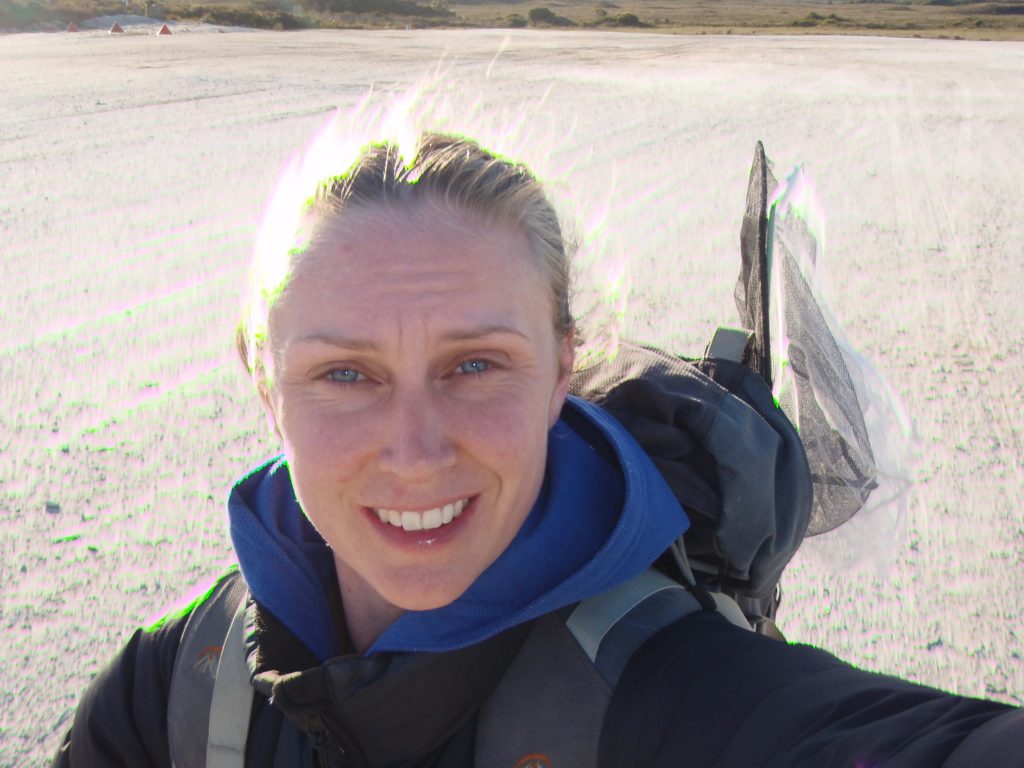Podcast: Play in new window | Download
Subscribe: Apple Podcasts | RSS
Dr. Jamie Voyles is an Assistant Professor of Biology at the University of Nevada, Reno. She received her B.A. in Zoology and Anthropology from the University of Washington, her M.S. in Integrative Physiology from the University of Colorado, Boulder, and her Ph.D. in Public Health from James Cook University in Australia. Afterwards, she conducted postdoctoral research at University of Idaho and at the University of California, Berkeley before accepting her current position. In our interview, Jamie speaks more about her experiences in life and science.
People Behind the Science Podcast Show Notes
Life Outside of Science (2:03)
With so many spectacular mountains nearby, Jamie loves spending her free time outdoors skiing, rock climbing, or mountain biking. Her adorable 6 month old puppy often accompanies her on these adventures.
The Scientific Side (3:06)
Research in Jamie’s lab focuses on diseases of wildlife. This is an exciting area that spans many different subdisciplines of biology including immunology, physiology, microbiology, ecology, and evolutionary biology.
A Dose of Motivation (4:14)
Never give up.
What Got You Hooked on Science? (8:02)
Both of Jamie’s parents were scientists, and they encouraged her to follow her interests. Initially, Jamie was fascinated by space and wanted to become an astronaut. She won a scholarship to attend space camp, and it was an awesome experience. Over time, Jamie’s interests shifted towards biology. As an undergraduate student, she participated in field research on birds. These projects brought her to Argentina where she studied penguins and to Alaska where she investigated a type of bird called the pigeon guillemot. Jamie’s interests next led her to amphibians and her current research in wildlife diseases.
The Low Points: Failures and Challenges (14:29)
A major dilemma in doing research on infectious diseases is that it can be tough to do robust science when the organisms you are trying to study are disappearing or dying for unknown reasons. It has been particularly challenging for Jamie when working in remote areas that don’t have all the normal lab resources. In Panama, Jamie and her colleagues needed to isolate a particular pathogen while working in a secluded part of the jungle. They had to transport liquid nitrogen containers into the mountains on horseback and were using kerosene lanterns for their microbiology sterile technique. Despite these difficulties, Jamie’s team was ultimately successful in isolating the pathogen and getting the needed samples.
A Shining Success! (17:20)
Jamie and a colleague conducted research on amphibians in Panama when their populations began declining due to disease. The disease spread much faster than Jamie expected, and when she returned to Panama, it was really difficult to find any Panamanian golden frogs. There were even rumors that the frogs had gone completely extinct. After two months of searching the jungle, they finally found one frog alive and well. This was extremely exciting, and it showed that at least some of the frogs survived. It also prompted a lot of interesting scientific questions that they could begin working to answer. The discovery of this single frog made all the long days of hard work, rain, mud, and bug bites worth it.
Book Recommendations (21:26)
On Immunity: An Inoculation by Eula Biss
Most Treasured Travel (23:05)
When Jamie was in Australia, she was able to travel to Christmas Island to help colleagues with a study on the crabs there. Christmas Island is famous for its red crabs and large coconut crabs. Some of the coconut crabs were as big as house cats, and it was remarkable to watch them slowly lumbering around and climbing up trees. The crabs were also very curious. Many of them approached the researchers and tried to check out what they had in their backpacks. Running around catching crabs for data collection was an amazing experience, and Australia is a paradise for biologists with its remarkable wildlife.
Quirky Traditions and Funny Memories (27:38)
Many scientists Jamie has worked with have quirky senses of humor, and they have a lot of fun together. Jamie and her lab members recently had a lab meeting that involved a competition for creatively decorating the lab’s ethanol bottles. These bottles are used to spray down the countertops to keep the lab clean. This chore isn’t very fun or exciting, so they used stickers, markers, and other materials to dress up their lab cleaning supplies. Now the decorated ethanol bottles are scattered around the lab, and they make cleaning the lab benches a lot more fun.
Advice For Us All (33:59)
Never give up. Persistence and determination are key to success in science, and it’s important to follow what the data tell you. Also, doing science is a fun and fantastic career.
Guest Bio
The Voyles lab studies emerging infectious diseases and conservation of wildlife. We take a “One Health” perspective, recognizing that human, plant, animal, and ecosystem health are inextricably connected. Because disease is a dynamic interaction between hosts, pathogens, and their shared environments, our research bridges many different scientific fields, ranging from microbial biology and organismal physiology to evolutionary biology and ecology. The Voyles research group uses a very wide variety of techniques (both in the laboratory and in the field) to pursue key questions in the study of infectious disease. The ability to work across multiple levels of biological organization, and implement many different techniques, allows us to actively pursue exciting questions in disease ecology and investigate how emerging disease is shaping our natural world.

Leave a Reply